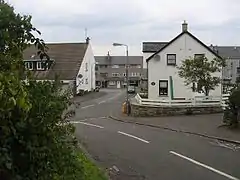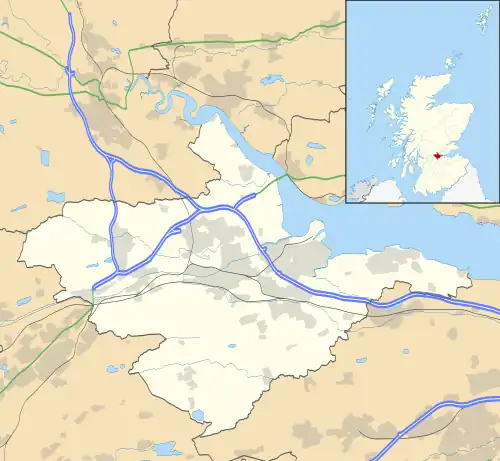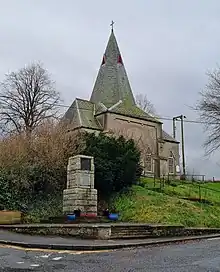Blackness, Falkirk
Blackness is a small village and harbour at Blackness Bay, an inlet of the Firth of Forth in Scotland.[3] It lies 3.4 mi (5.5 km) east-southeast of Bo'ness, 5.0 mi (8.0 km) west-northwest of South Queensferry and 3.8 mi (6.1 km) north-east of Linlithgow, within the council area of Falkirk. It was formerly part of the historic county of West Lothian.
Blackness
| |
|---|---|
 A view of houses in the village of Blackness | |
 Blackness Location within the Falkirk council area | |
| Population | 135 [2] (2001 census) |
| OS grid reference | NT051800 |
| • Edinburgh | 13.4 mi (21.6 km) SE |
| • London | 341 mi (549 km) SSE |
| Civil parish | |
| Council area | |
| Country | Scotland |
| Sovereign state | United Kingdom |
| Post town | LINLITHGOW |
| Postcode district | EH49 |
| Dialling code | 01506 |
| Police | Scotland |
| Fire | Scottish |
| Ambulance | Scottish |
| UK Parliament | |
| Scottish Parliament | |
| Website | falkirk.gov.uk |
At the 2001 Census Blackness was reported as having a population of around 135 residents.[2]
History
The village originally served as a port for nearby Linlithgow, which was a principal residence of the Scottish monarchs from as early as the 12th century. James IV gave the village to one of his household servants, John Kirkwood, Master of the Larder, in January 1502.[4] As a port, Blackness was later superseded by Bo'ness, and fell into decline in the late 17th century.[3]
There are two listed houses in the village. Blackness House is an early 19th century Georgian house that is Category B listed.[5] Blackness Low Valley House is a mid-18th century house that is Category C listed.[6]

In 1875, a public water hand-pump was installed in the village and this is, along with a newer hand-pump, located against a wall opposite a block of flats in the center of the village.[7]
In 1914, the St Ninian’s Blackness Mission Church was erected in the village.[8]
On 23 December 1922, the village First World War memorial was unveiled.[9] The memorial also records names from the Second World War.[10]
The old smithy has long since shut its doors, as has the post office and the dairy which once operated from the village.
Blackness Castle
The small village is dominated by Blackness Castle, situated on a promontory overlooking the bay. The castle primarily dates to the early 15th century being built by Sir George Crichton, Earl of Caithness and Admiral of Scotland.[11] It served as a fortified residence and a prison before passing to Crown ownership under James II of Scotland in 1453.[11] Additional modifications to the castle were made in the 16th and 17th centuries in response to the development of artillery.[11] From 1870 until 1912, Blackness castle was the central munitions depot for Scotland and housed officers and men in a nearby barracks block and officers quarters.[11] The castle is currently under the care of Historic Scotland and open to paying visitors.[11] The castle and surrounding area has been used as a setting for several films and tv series including Hamlet,[12] the Starz series Outlander[13] and the BBC production of Ivanhoe.[14]
Community facilities

Blackness Yacht Club currently use the village as a base for its sailing activities. In addition to the castle and the boat club, the village contains a small variety community shop and a pub restaurant named The Lobsterpot that was the site of a former pub and adjacent to the 17th century Customs House.[15]
There is a public toilets in Blackness that is the last open public toilets in the Falkirk council area.[16]
There is a primary school on the western edge of Blackness. In 2022, it was reported that the school had only 8 pupils on its rolls and Falkirk Council were considering closing the school.[17][18]
There is limited parking in the village for visitors which resulted in a public vote taking place in the village in 2020 to decide on public access.[19]
References
- Blackness entry in Am Faclair Beag Retrieved 29 March 2023
- No 3 - 2001 Census Population of settlements and wards Archived 2011-06-03 at the Wayback Machine, www.falkirk.gov.uk. Retrieved 2011-05-17
- Munro, David (2006). Scotland. An Encyclopedia of Places & Landscapes. Collins. p. 73. ISBN 9780004724669.
- Register of the Privy Seal of Scotland, vol. 1 (Edinburgh, 1908), p. 112 no. 760.
- Historic Environment Scotland. "BLACKNESS HOUSE (Category B Listed Building) (LB4131)". Retrieved 4 January 2023.
- Historic Environment Scotland. "BLACKNESS LOWVALLEY HOUSE (Category C Listed Building) (LB4131)". Retrieved 4 January 2023.
- Historic Environment Scotland. "Blackness, Pump (49512)". Canmore. Retrieved 4 January 2023.
- Historic Environment Scotland. "Blackness, Blackness Mission Church (274773)". Canmore. Retrieved 4 January 2023.
- "Blackness and District". Imperial War Museums. Retrieved 4 January 2023.
- Historic Environment Scotland. "Blackness, St Ninians Way, War Memorial (338906)". Canmore. Retrieved 4 January 2023.
- Historic Environment Scotland. "Blackness Castle (SM90036)". Retrieved 4 January 2023.
- Scotland: the Movie Location Guide - Hamlet - Blackness Castle Archived 3 October 2008 at the Wayback Machine, www.scotlandthemovie.com.
- "Outlander Film Locations" (PDF). VisitScotland. Retrieved 5 September 2017.
- Visit Scotland - Blackness Castle Archived July 24, 2008, at the Wayback Machine, guide.visitscotland.com.
- Historic Environment Scotland. "Blackness, Custom House (146115)". Canmore. Retrieved 4 January 2023.
- "Calls for more public toilets as Falkirk area drops from 17 to one in 15 years". Falkirk Herald. Retrieved 4 January 2023.
- "Falkirk Council: Proposal to mothball Blackness Primary". Falkirk Herald. Retrieved 4 January 2023.
- "Falkirk Council plan to mothball primary school with just eight pupils". Daily Record. Retrieved 4 January 2023.
- "Blackness residents to vote on pub's fate as parking hinders business". Falkirk Herald. Retrieved 4 January 2023.